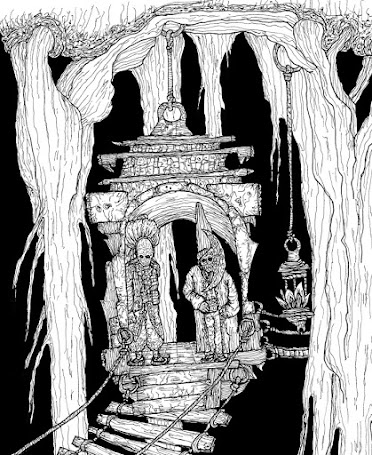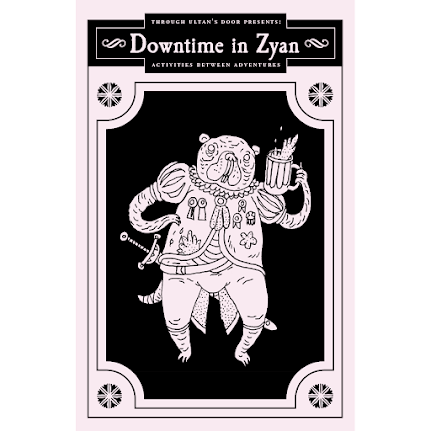Mothership has a wonderful character creation process, where a few random “flavor” rolls both convey a lot about the setting, as well as tantalizing suggestions about the character. One of these is a roll for a patch. In the new Mothership campaign I have begun, one of the player characters, Isaac, is an android. Isaac’s player rolled a patch that said “Travel To Distant Places /Meet Unusual Things / Get Eaten”. Incredibly, he rolled for his loadout (starting equipment) Manufacturer Supplied Attire (AP 1), Jump-9 Ticket (destination blank). Riffing on the android class, with it’s uncanny valley features, and these poignant travel-themed details, the player decided that his character was an older, obviously inhuman model. Ashamed of his own limited humanity, he had taken to traveling the universe, collecting experiences and travel photos as though the very human activity of being a tourist would somehow make him more human.
When the party completed the scenario Bones & Videotape and received a large payout I asked them what they wanted to spend their 200k credits on. Without missing a beat, Isaac’s player said that he wanted to buy upgrades to be more like a newer model, and so more human.
Since I found this Tin Man scenario touching, and since we’ve decided to proceed with a full blown Mothership campaign playing Gradient Descent, where the line between human and android is a great theme, I decide to write a full downtime activity for Isaac. This is intended as a set of upgrades offered to androids, preying on their deeply felt desires for human experience and perhaps internalized self-loathing, to sell them a vision of “becoming truly human”.
One thing I became interested in while trying to write the upgrades is how clearly the vision of “being human” on offer privileged a neurotypical human experience. In essence, the idea of “upgrading” “abilities” to “become more human” immediately raised the question of what it means to be human in a register that suggested an ableist answer to this question. I decided to lean into this. Androids are indeed being sold by corporations and chop shop doctors a crude picture they may have of “what it is to be really human” that characterizes human beings at best only unevenly and problematically.
For the purposes of this system, Androids begin with a “Humanity” score. (Note: this is a reverse version of “the Bends” from Gradient Descent”—for a similar aproach see this wonderful thread, which contains spoilers.) “Humanity” is a score that indicates how much the line between android and human has been blurred. I think it would be natural to use this score to see if an android can “pass” as a human in some circumstance. Personally I won’t be doing that, because my table includes a trans player, who is not playing the android character. I don’t want a casual jokey approach to medical interventions that result in changes to the body along some identity line, where the politics and desire to “pass” get thematized in a casual and potentially careless way. (If it were their character, and their idea, I absolutely would be open to exploring this theme through the post-human lens.)
Another use for the “Humanity” score is to adjudicate whether the android PC does things in a human way. Because Mothership does not tell you what an android is and how they differ from a human, this question comes up all the time. Some of the modification below flesh out the differences, but many others are not mentioned. You can always roll “Humanity” to see whether your PC functions in a human way. You can also use it to see whether the android can mitigate the “uncanny valley” effect in some social circumstance to overcome human prejudice, which is probably how I will mainly be using it. (In Gradient Descent, Monarch will also weaponize this score.)
Becoming Human Downtime
Isaac’s model is Mark VII running Cumulus wetware operating system (brain), created by Cloud Industries. The most advance model on the market now is Cloud Industries’ Mark X running Alto Stratus wetware. The Mark X is an exorbitant model. Mark X’s with a full suite of upgrades can be found as companions and assistants for corporate executives, ambassadors, and socialites.
The Mark X acts and experiences the world as a human to a greater degree than older models. With a lot of money and surgical interventions, one may further tighten the gap. Here are the starting “Humanity” scores for different models, along with what features they come already equipped with. When an android character is created, the Warden and player decide together what model they are, although for working class space horror on dingy freighters, it is likely that the character will be a Mark VII or Mark VIII.
Mark VII: Humanity 0, No upgrades
Mark VIII: Humanity 5, Skinstillation, Emotion Processing Upgrade I
Mark IX: Humanity 10, as Mark VIII plus Karotin Production Module, Emotion Processing Upgrade II
Mark X: Humanity 20, as Mark IX plus Blushware, Positive Affect Enhancer, Humor Upgrade, Chuckleware
Procedures
An android may take the downtime action of Becoming Human by locating a chop shop and paying the listed amount for any single upgrade for which they possess the pre-requisites. After declaring the downtime action and spending the required credits, the player rolls the die indicated in the upgrade description to see how much “Humanity” the android acquires. The player then makes the save listed for the upgrade, suffering the results listed for a failure until the next downtime unless a longer duration is specified.
Note that the text of these upgrades are written in corporate adspeak.
Upgrade Your Humanity!
Skinstillation 25kcr
Tired of looking like a plastic crash test dummy? Upgrade your skin to have a more natural, “almost human” look. Elicit admiring responses like, “I thought I was talking to an actual person.”
Increase “Humanity” by 1d4.
Failed body save: Break out in egregious acne.
Blushware 10kcr
Pre-requisite: skinstillation. Tired of always looking so dull? Let your inner blush show when those compliments rain down! Introduce natural human coloring that is responsive to exertion and emotion state.
Increase “Humanity” by 1.
Failed body save: Turn beet red at even the slightest embarrassment.
Sweatshopped 10kcr
Pre-requisite: skinstallation. Produce perspiration when the weather is hot or you are working hard. Nothing says “being human” like wiping the sweat from your brow. Smell like a human does too — so relatable!
Increase "Humanity” by 1.
Failed body save: Sweating profusely. Clothes stink.
Karotin Production Module 10kcr
Grow real hair and nails in all the normal spots, just like a human would. Luxuriate in your full mane of hair. Ask yourself, is the real you a blond?
Increase “Humanity” by 1.
Failed body save: the hair is a distraction, rubbing the wrong places, brushing shoulders, in your eyes. Make combat rolls with [-].
Digestimax 25kcr
Tired of eating androjuice and protein slurry all the time? Install a digestive system, so that you can process and derive nourishment from solid foods. Complete with the full human waste disposal system.
Increase “Humanity” by 1d4.
Failed body save: Vomit when attempting to choke down solid foods.
Tastemaker 50kcr
Pre-requisite: digestive system installation. Have trouble caring about what nutrients you put into your mouth? Imagine savoring the taste of synthesteak, and the floral bouquet of a glass of nuchardonnay in the dim light of your favorite bistro. With this upgrade, you too can be a regular.
Increase “Humanity” by 1d6.
Failed body save: Constant craving. Every hour eat a ration or acquire 1d6 stress.
Orgone Equipment 50kcr
You don’t need to be flat down there! Get sex organs so that you can experience the oh-so-human pyrotechnics of sexual fulfillment.
Increase “Humanity” by 1d6.
Failed body save: absolutely horn-dogging it.
Emotion Processing Upgrade I 50kcr
Supercharge your wetware with more intuitive understanding of the emotional responses of human beings. Increase your cognitive empathy and learn to “read the room” and “pick up on social cues”.
Increase “Humanity” by 1d6.
Failed sanity save: Horrified by the contempt you now realize human beings radiate towards you. Gain 1d6 stress.
Emotion Processing Upgrade II 100kcr
Pre-requisite emotion processing upgrade I. Bring your cognitive empathy close to that of an average neurotypical human being! Adds a neural net to your wetware that advances significantly your ability to understand the emotional state of human beings.
Increase “Humanity” by 1d8.
Failed sanity save: Astounded by the network of
Negative Affect Enhancer 25kcr
Savor bittersweet regrets. Allows you to feel more fully a range of negative emotions, such as fear, anger, and despair.
Increase “Humanity” by 1d4.
Failed Sanity save: Your fear save lowers by 20 points. Permanently.
Hatecore 25kcr
Allow the hate to flow through you! Have you ever wondered what it would be like to really hate those who have abused you as an android? Relish the dish that is best served cold.
Increase “Humanity” by 1d4.
Failed Sanity save: Acquire an obsession with revenge against an NPC. Each downtime you do not take steps towards vengeance, gain 1d4 stress.
Positive Affect Enhancer 50kcr
Ever wonder what it feels like to have “a good day”? Wonder no longer. The positive affect enhancer allows you to feel more fully a range of positive emotions, such as affection, pride, or contentment.
Increase “Humanity” by 1d6.
Failed sanity save: Your newfound positive feelings blunt your edge. Take [-] on all speed saves.
Love Handle 100kcr
Pre-requisite: Positive affect enhancer. Experience love, the most human emotion of all. Lose you head with infatuation on your new crush or fall head over heels for your soul mate. You too could find a match made in heaven!
Increase your “Humanity” score by 1d8.
Failed sanity save: You acquire an ongoing crush. Maintain the crush until you try to shake it by taking a relevant distracting downtime action and succeeding at an intellect save. Each downtime the crush persists, you must attempt to cultivate a relationship with the love interest during downtime or take 1d6 stress.
Chuckleware 100kcr
Pre-requisite: Positive affect enhancer. Instead of being the butt of the joke, what if you could be in on it? Let the hilarity of the universe wash over you and take refuge in a good joke during hard times.
Increase your “Humanity” score by 1d8.
Failed sanity save: You spontaneously laugh at inappropriate moments until the next downtime. At sensitive moments, the Warden will ask for sanity save to avoid loud laughter, e.g. revealing your location if hiding or offending NPCs.
Oneiric Core 100kcr
Pre-requisit: Positive affect enhance, negative affect enhancer. What could be more human than to sleep, perchance to dream? Instead of powering down or entering maintenance mode, cozy up beneath the blankets for a good nights sleep! Experience that rich and meaning laden dream life you’ve been hearing so much about.
Increase your “Humanity” score by 1d8.
Failed sanity save: Anxiety dreams and nightmares rattle you. Take 1d6 stress.
Aesthetic Receptor 100kcr
Pre-requisite: Positive affect enhancer, negative affect enhancer. Ready to get the chills or lose yourself in tears while lost in your favorite novel? Take the step from cold rational appreciation to the warm emotive responses that suffuse human aesthetic appreciation.
Increase your “Humanity” score by 1d8.
Failed sanity save: The Warden will inform you when you are struck by the magisterial beauty of something: space, an explosion, the unfolding of an alien form. On a failed sanity save, you are rooted to the spot and cannot act for the round.

.jpg)















